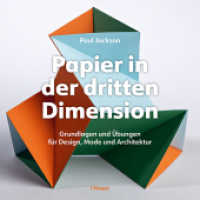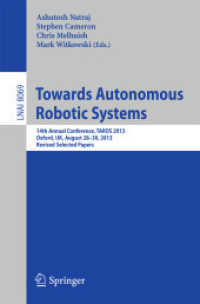- ホーム
- > 洋書
- > 英文書
- > Politics / International Relations
Full Description
Appeasement is a controversial strategy of conflict management and resolution in world politics. Its reputation is sullied by foreign policy failures ending in war or defeat in which the appeasing state suffers diplomatic and military losses by making costly concessions to other states. Britain's appeasement policies toward Germany, Italy, and Japan in the 1930s are perhaps the most notorious examples of the patterns of failure associated with this strategy. Is appeasement's reputation deserved or is this strategy simply misunderstood and perhaps improperly applied?
Role theory offers a general theoretical solution to the appeasement puzzle that addresses these questions, and the answers should be interesting to political scientists, historians, students, and practitioners of cooperation and conflict strategies in world politics. As a social-psychological theory of human behavior, role theory has the capacity to unite the insights of various existing theories of agency and structure in the domain of world politics. Demonstrating this claim is the methodological aim in this book and its main contribution to breaking new ground in international relations theory.
Contents
Part I: Role Theory: The Puzzle of Britain's Appeasement Decisions in the 1930s. 1. The Appeasement Puzzle in World Politics 2. Modeling the Appeasement Strategy. 3. Role Theory and the Uncertainty Problem in International Relations Theory. Part II: Role Demands: Substantive Rationality and Structural Adaptation. 4. Britain's Roles in the Sino-Japanese Conflict, 1931-1933. 5. Britain's Roles in the Italo-Abyssinian and Rhineland Conflicts, 1934-1936. 6. Britain's Roles in the Search for Peace, 1937-1938. 7. Britain's Roles on the Road to War, 1939-1941. Part III: Role Conceptions: Bounded Rationality and Experiential Learning. 8. Psychological Mechanisms and British Decision-Making Processes. 9. Turning Points for Peace: The Anschluss and the Sudeten Conflict in 1938. 10. Turning Points for War: The Prague Coup and the Polish Conflict, 1939. Part IV: Role Enactments: Communicative Rationality and Altercasting. 11. Binary Role Theory and Britain's Appeasement Decisions. 12. Crossing Simon's Bridge: Is Binary Role Theory a Theory of Everything






